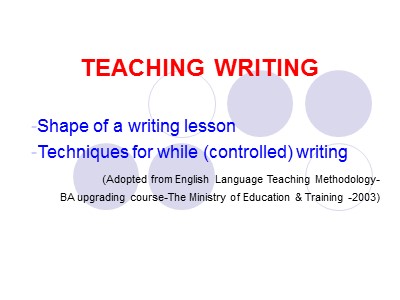Teaching writing
1. Substitution boxes
The teacher puts a box full of words on the board. The words fit together to either make one long sentence or lots of short sentences. The class is divided into strong groups and weak groups. The strong groups write down one long sentence while the weak ones write down as many different short sentences as possible. For stronger groups, the sentence with the most words in the given time is the winner. For weaker groups, the group with the most sentences is the winner.
2. Transformation writing
The teacher gives the students handouts with a
short paragraph or a letter. The students
rewrite the paragraph or letter as required by the
teacher. The teacher can change information in
the paragraph in three different ways: change the
grammar (e.g. from the future to the past or from ‘I’
to ‘he’); change the facts (e.g. from England to
Vietnam); change the meaning (e.g. from ‘sad’ to
‘happy’).
Tóm tắt nội dung tài liệu: Teaching writing

TEACHING WRITING Shape of a writing lesson Techniques for while (controlled) writing (Adopted from English Language Teaching Methodology- BA upgrading course-The Ministry of Education & Training -2003) Shape of a writing lesson Revision Word Cue Drill Pre-Writing Stage - Establishing who, what, why.. - Making use of words, structures needed for the writing task - Drafting & Redrafting While-Writing Stage - Performing the writing Post-Writing Stage Sharing & Comparing Feedback & correction Techniques for while – (controlled) writing Substitution boxes Transformation writing Questions and answers Write - it – up Recall 1. Substitution boxes The teacher puts a box full of words on the board. The words fit together to either make one long sentence or lots of short sentences. The class is divided into strong groups and weak groups. The strong groups write down one long sentence while the weak ones write down as many different short sentences as possible. For stronger groups, the sentence with the most words in the given time is the winner. For weaker groups, the group with the most sentences is the winner. 2. Transformation writing The teacher gives the students handouts with a short paragraph or a letter. The students rewrite the paragraph or letter as required by the teacher. The teacher can change information in the paragraph in three different ways: change the grammar (e.g. from the future to the past or from ‘I’ to ‘he’); change the facts (e.g. from England to Vietnam); change the meaning (e.g. from ‘sad’ to ‘happy’). 3. Questions and answers The teacher gives students a series of questions. The students answer the questions in full sentences. The students have to, where possible, combine two sentences into one and then put the sentences together to form a coherent paragraph. 4. Write - it – up The students write notes or fill in grids using the information collected from any speaking, listening or reading activities. Then, they ‘write it up’ in full sentences, or as a paragraph. 5. Recall This technique is used in the final stage of the lesson. After listening to /reading a story, students are asked to rewrite it, using their own language. Students can work in pair or group.
File đính kèm:
 teaching_writing.ppt
teaching_writing.ppt

